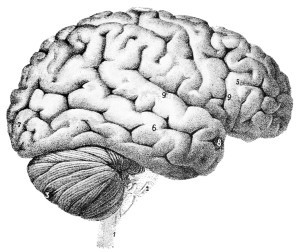As a psychology major, you’ve studied the science of the mind, brain, and behavior. From the synapses that fire in our brains to the greater patterns of human development and interaction, psychologists learn the inner workings of the mind and the ways in which they contribute to greater social phenomena. You might have focused on topics such as how the brain works, human life develops, counseling and social psychology, mental disorders, and how we acquire new knowledge and memories. In short, you’ve learned what makes us tick as human, and therefore social, beings.

via Wikimedia Commons
Of the 1,650,014 bachelor’s degrees awarded in the 2009-2010 academic year, psychology degrees made up 97,216 or 5.89% of them. The percentage of degrees awarded is down slightly from 5.99% in the 1999-2000 academic year, but the number of psychology degrees has increased from 74,191 in 1999-2000 thanks to the overall number of degrees awarded (Source).
Many psychology programs provide opportunities to specialize within the major, in areas such as cognitive, social, cultural, and developmental psychology, psychopathology, and neuroscience.
While potential employers might not be interested in how well you can recite Freud’s repressive hypothesis, they do care about the skill set you’ve developed as a psychology major and how you can apply your knowledge of human mind and behavior outside of the classroom.
As a social science, psychology is often both quantitative and qualitative, and as such those that study psychology are well equipped in tasks that require research and data analysis. Most psychology majors require courses in research methods and statistics. As a psychology major you’ve learned a variety of research methods and how to implement them ethically, as well as how to analyze the data that is derived from experiments. These skills are valuable not only in jobs involving intensive research but also in any other industry with big data, especially if you know SPSS or R.
You’ve likely had to write a fair number of reports and papers as a psychology major, and you probably had to present a few of them as well. All of this work has paid off in honing your literacy in speaking and writing. Strong communication skills are essential for every job, from making the first impression to representing your company well.
As a psychology major you’ve studied individuals and groups as subjects, and have worked with individuals and groups on projects. Almost every job involves working on a team at least occasionally, with some requiring teamwork on a daily basis, and your experience working in a group environment gives you a distinct advantage in understand others as coworkers as well as human beings, contributing to interpersonal skills that will likely outshine your classmates who have been buddied up with computer monitors for the past four years.
In observing human behavior in the real world and transferring your findings to paper, the process of conducting a psychological experiment is likewise one of conducting critical analysis, extracting meaningful findings from observations and data. This ability to find correlations and trends is extremely valuable in many different job markets.
Depending on your experiences and other interests, you may have acquired additional skills in your psychology major that can help bolster your experience and prepare you for an entry-level job.
Completing a senior thesis or research project requires seeing a project of several months through from beginning to end. This probably involved setting deadlines and achievable goals, reporting on your progress, and holding yourself accountable. All of these skills are valuable job skills in any industry.
If you’re interested in the neuroscience side of psychology, you might be interested in other careers related to
You need to go to graduate school if you want to become a psychologist, but there are a wide variety of jobs well-suited for psychology majors with a bachelor’s degree.

via Flickr User Alan Cleaver
Human Resources
Median Pay: $43,000
Just about every company in every industry has a human resources department, and these positions are great for psychology majors, especially those interested in work psychology. Human resources deals with organizing the employees of a workplace, from recruiting to making sure everything is done legally. In an HR position, you’ll apply the interpersonal, interviewing, and speaking skills you’ve developed, and your ability to train new employees may just prove invaluable to a company looking for a new HR representative.
Research
Median Pay: $49,000
Having a degree in psychology doesn’t mean that you just research psychology. With a bachelor’s degree you can work at many labs as a lab assistant or associate. If you’re interested in neuroscience or quantitative psychology, you can create even more opportunities. Your time designing and conducting experiments of your own, analyzing the findings, interviewing your subjects, and programming the data all translate efficiently to a position in the field of research
Casework and Counseling
Median Pay: $52,000
One of the quintessential jobs for psychology majors, working in casework and (in some cases) counseling is something you can do with a bachelor’s degree. A few options include working in the nonprofit sector lending a hand to the less fortunate, substance abuse casework, and crisis centers. All of these tap into your ability to research, interview, speak, and write.
If you aren’t already good with a statistical analysis program such as SPSS or R, get good with one. Knowing how to manipulate data is extremely valuable in the workplace, particularly in research and other quantitative industries.
You might already know Microsoft Word from writing papers, but knowing how to use the rest of the Office suite (especially Excel and its data-manipulating techniques) can give you a big leg up.
| Adjunct - Psychology Columbus State Community College Columbus, OH | View |
| Licensed Clinical Psychologist Headway Columbus, OH | View |
| Adjunct - Psychology Centralohioatd Columbus, OH | View |
| School Psychologist for possible summer evaluations'); ' Educational Service Center Of Central Ohio Columbus, OH | View |
| School Psychologist Soliant Health Columbus, OH | View |
| 2025 – 26 SCHOOL PSYCHOLOGIST Columbus City Schools - Ohio Columbus, OH | View |
| Licensed Clinical Psychologist Headway Columbus, OH | View |
| Clinical Consultant Social Worker - (MSW/LSW), Dublin&Grady (Dublin) OhioHealth Dublin, OH | View |
| Travel Social Work - Licensed Clinical Social Worker - $1,674 per week Focus Staff Columbus, OH | View |
| School Psychologist Total Education Solutions Columbus, OH | View |